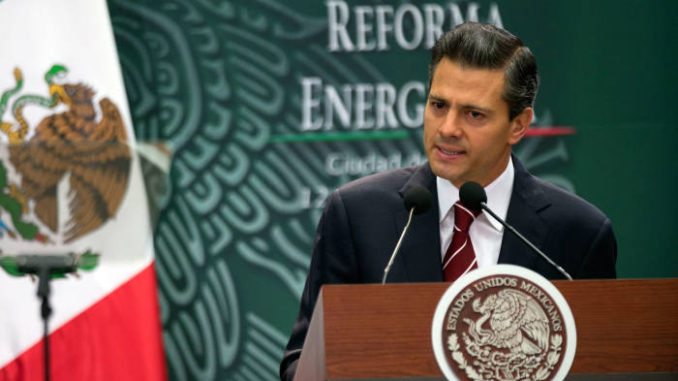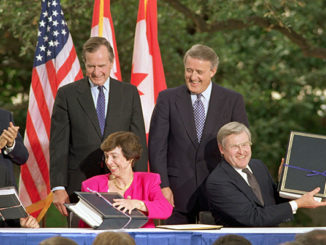
By NICOLAS BERGGRUEN and NATHAN GARDELS
Two decades ago, one of Mexico’s leading social critics proclaimed Los Angeles “the heart of the Mexican dream.” Pedro P. agreed, leaving behind his native Oaxaca for work as a gardener in the city’s San Fernando Valley. After 14 years as an undocumented immigrant, however, Pedro, age 44, is heading home at the end of April, drawn by an economic resurgence south of the border that has led some observers to label Mexico the “Aztec tiger.”
He is hardly alone. According to the Mexican Migration Project, the rate of undocumented emigration to the U.S. is nearing zero. It peaked at about 55 of every 1,000 Mexican men in 1999; by 2010 it had fallen to 9 per 1,000, a rate not seen since the 1960s.
When President Barack Obama visits the new president of Mexico next week, he will find a country very different from its usual image in the U.S. Even with its bloody drug war, Mexico saw its economy grow by 4% in 2012, a rate that is expected to reach as much as 7% annually in the years ahead. In 2012, foreign investors pumped $57 billion into Mexican stocks and bonds, five times what they invested in Brazil. Big manufacturers like Bombardier and General Electric GE +1.18% are expanding their facilities there and creating high-wage jobs, taking advantage of the country’s deep pool of engineering and professional talent.
Manufacturing is even returning from China, where it started to emigrate in the 1990s, about the same time that Mexican immigration to the U.S. swelled. The annual hourly wage in Mexico is now $2.10, compared with $1.63 in China. Add in the lower costs of transportation to the great market to the north and Mexico’s own expanding domestic market, and the economic attraction is clear.
More surprisingly, the growing sense of a Mexican turnaround is based not just on economic prospects but on greater confidence in the Mexican government, especially at a time when elected leaders in more-developed countries seem to be at a loss in dealing with long-term problems.
Like most Mexicans at home, those working abroad have long been suspicious of the country’s politicians, especially those of the PRI—the notoriously corrupt autocratic party that ruled for 71 years before the country’s democratic transition 12 years ago. Now the PRI is back, this time through fair elections, and its charismatic new leader, President Enrique Peña Nieto, is promising to take Mexico to the next step as a fully globalized middle-class society.
At his inauguration last December in Mexico City, Mr. Peña Nieto stood in front of the country’s most powerful monopolists, Carlos Slim Hélu and Emilio Azcarraga Jean, and promised to disband their television and telecom empires. To robust applause, he promised to reform the teacher’s union which, incredibly, has long had the power to hire teachers and even to pass on hereditary jobs. And he pledged to “open up” Pemex, the laggard state oil monopoly that has been the core of Mexico’s nationalist ideology since the 1930s.
The inaugural audience was stunned by the scope and specificity of the new president’s program—and the fact that he was openly taking on the historical pillars of the PRI’s power. The day after his inauguration, he broke the partisan rancor of the election campaign, in which the PRI won just 38% of the vote, by announcing a consensus “pacto” with other major parties that agreed to support his list of reforms.
Six months into his term, Mr. Peña Nieto has begun to deliver. The head of the teachers union, Elba Esther Gordillo —known for her luxe wardrobe and accessories—was arrested for embezzlement. New laws have been passed to empower the government to break up the telecom and television monopolies. Plans for opening up Pemex are well under way, and legislation is imminent.
Mr. Peña Nieto’s success is hardly assured. Rooting out corruption and establishing a fully functional legal system will be enormous challenges. But unlike many other national leaders, he is addressing in practice the central crisis of our times: how to effectively govern modern democracies that by their nature generate discord and disagreement.
The strength of one-party autocracies like the old PRI—or China’s modern mandarinate—is their unity of purpose and their capacity to implement structural change over the long term. By contrast, democracies today across the West are paralyzed, unable to build a consensus out of the cacophony of voices and multitude of interests.
The trick for Mexico, and for other countries, will be to balance this impressive institutional capacity with transparency and public oversight. Effective governance is a fine thing, but not at the cost of democratic accountability.
The Peruvian novelist Mario Vargas Llosa once famously called Mexico under the old PRI “the perfect dictatorship.” It had the trappings of democracy—regular elections and a transfer of power every six years—but was ruled by the iron fist and the greased palm. Under Mr. Peña Nieto, Mexico now has the chance to perfect its democracy—and to serve as a model for the world.
—Messrs. Berggruen and Gardels are co-authors of “Intelligent Governance for the 21st Century: A Middle Way Between West and East.”



